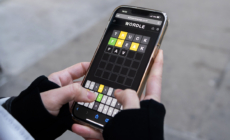-
Costco Guys More Popular Than Roman Reigns, Says Former AEW Superstar - 20 mins ago
-
Organized Looting Throws Gaza Deeper Into Chaos - 31 mins ago
-
Today’s ‘Wordle’ #1,283 Answers, Hints and Clues for Monday, December 23 - 55 mins ago
-
Artists We Lost in 2024, in Their Words - about 1 hour ago
-
John Cena vs Logan Paul ‘On The Table’ For WrestleMania 41: Report - 2 hours ago
-
Ron Eliran, Israeli ”Ambassador of Song,” Has a Bar Mitzvah at 90 - 2 hours ago
-
Phillies Predicted To Cut Ties With Trade Acquistion Austin Hays - 2 hours ago
-
Mets Likely To Sign Pete Alonso Amid Depleted First Base Market - 3 hours ago
-
Trump Picks Callista Gingrich for Ambassador to Switzerland - 3 hours ago
-
NASCAR Cup Series Team Confirms 2025 Daytona 500 Entry Plans - 3 hours ago
Swing State With Ticket-Split History Backs Trump and Top Democrats
Many North Carolina voters split their ballots, supporting Republican former President Donald Trump for the third time while backing Democrats in various state offices, including governor, attorney general, superintendent, secretary of state and in the state Legislature, in a move that a political professor told Newsweek “isn’t abnormal” in the state.
North Carolina was the first battleground state called for Trump late Tuesday night. As of Wednesday morning, with 95 percent of votes counted, The New York Times reported that Trump led with 51 percent of the vote, securing over 2,875,000 votes, compared to Vice President Kamala Harris’s 47.7 percent and about 2,683,000 votes.
In 2016, Trump won the state by a 3.6 percent margin. That lead shortened against President Joe Biden in 2020, when Trump won by 1.3 percent.
While ballots are still being counted, as of Wednesday morning, Trump was winning the 2024 popular vote nationally with roughly 71,500,000 votes to Harris’ 66,670,000.

AP Photo/Grant Halverson
North Carolina voted for Trump for a third time on Tuesday, but the state also supported Democratic leaders down ballot, including a U.S. House seat.
Jason Husser, director of the Elon poll and professor of political science at the university, told Newsweek in a phone interview on Wednesday morning that “North Carolina has had a long history of ticket-splitting.” He noted that this was the case during Trump’s first two campaigns.
“Ticket-splitting isn’t abnormal in North Carolina,” Husser said, noting that it “is abnormal in this modern era of hyperpolarization, clear party loyalties and the demise of Southern Democrats.”
Democratic Governor Roy Cooper has served in the state’s top post as governor since 2017, while majority of the state’s voters supported all three of Trump’s presidential runs. However, in 2012, the state supported Republican presidential nominee Mitt Romney and Republican gubernatorial candidate Pat McCrory, and in 2008, the state backed President Barack Obama and Democrat Bev Purdue.
However, in the early 2000s, the state supported Republican President George W. Bush, and Democratic Governor Mike Easley.
Martin Kifer, chair of political science at High Point University, told Newsweek that the down the ballot-ticket-splitting in North Carolina shows that voters are more focused on the individual candidate than the party.
“This is a sign that voters—even though there was such intensity at the top of the ballot in the presidential race—were really distinguishing between candidates pretty far down the ballot,” Kifer told Newsweek.
At the top of the state’s ticket, Lieutenant Governor Mark Robinson lost the gubernatorial race to Democrat Josh Stein on Tuesday, with Stein garnering 55 percent of the vote to Robinson’s 40 percent.
Robinson, the Trump-endorsed candidate, came under fire earlier this fall when a CNN report uncovered his alleged activity on an adult website more than a decade ago, including posts that Robinson allegedly called himself a “Black NAZI,” defended slavery, repeated homophobic slurs and fondly recalled “peeping” on women.
Husser told Newsweek that Robinson’s unfavorability played a larger role than party allegiance, saying it’s “rooted in this case simply because Mark Robinson, the Republican candidate, is extremely unpopular.”
Steven Greene, a political science professor at North Carolina State University, told Newsweek in an email Wednesday morning that “Robinson’s performance was truly awful in this era of polarization where strong partisanship gives candidates a high floor.”
Further down the ballot, Democrats broke the state Legislature’s supermajority. The move “gives some more negotiating authority to the governor,” Kifer said. “If something passes through both houses of the general assembly, not having supermajorities means that if the governor vetoes it, then it sticks. If they have supermajorities, then they have a chance to try and override and have a lot better chance to override the veto.”
Husser echoed the sentiment, noting that “Josh Stein, the incoming governor, will enter with more power than Cooper currently has. He will have to have a seat at the bargaining table for legislation,” adding that the Democrats’ down-ballot break of the supermajority “greatly increases the power of the governor in that regard.”
There are more “unaffiliated” or independent voters in the state than any other party. According to the most recent voter data, there are 2,959,006 unaffiliated voters, 2,452,747 registered Democrats and 2,347,072 registered Republicans.
Source link



















